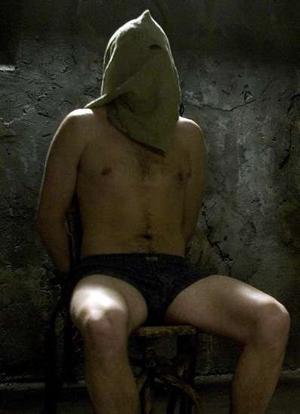Today the NYT reports that the Federal Trade Commission is not happy about the recent spate of horror films, some of which use torture as a central feature. Elsewhere, Slavoj Zizek argues that
most of us can imagine a singular situation in which we might resort to torture — to save a loved one from immediate, unspeakable harm perhaps. I can. In such a case, however, it is crucial that I do not elevate this desperate choice into a universal principle. In the unavoidable brutal urgency of the moment, I should simply do it. But it cannot become an acceptable standard; I must retain the proper sense of the horror of what I did. And when torture becomes just another in the list of counterterrorism techniques, all sense of horror is lost. [oomph mine]
the end of which resonates rather strongly, I think, with Paul Gilroy’s diagnosis of England’s postcolonial melancholia. Referring to the “pioneering social psychology” of German psychoanalysts Alexander and Margarete Mitscherlich, Gilroy applies to “the British people” what we might also apply to the American —
[the Mitscherlichs] warn that melancholic reactions are prompted by “the loss of a fantasy of omnipotence” and suggest that the racial and national fantasies that imperial and colonial power required were, like those of the Aryan master race, predominantly narcissistic. From this perspective, before the British people can adjust to the horrors of their own modern history and start to build a new national identity from the debris of their broken narcissism, they will have to learn to appreciate the brutalities of colonial rule enacted in their name and to their benefit, to understand the damage it did to their political culture at home and abroad, and to consider the extent of their country’s complex investments in the ethnic absolutism that has sustained it. (99) [oomph mine]
& perhaps the Australian as well, etc.

wikipedia defines ‘horror’ as the feeling of revulsion that comes after an event, and ‘terror’ as the anticapatory feeling before such an event.
maybe the success of horror movies, and attendant glut on the market right now, is a mass attempt to, more or less safely, relieve feelings of terror?
haha, now, does that mean the U.S. government feels that actual torture and it’s images are ok, but simulated torture is not ok, because they don’t WANT us to have safe outlets for our terror?
queue spooky X-Files music.
haha.
See also: “We love to torture” by A.S. Hamrah
hey have you, Mr. Andwax, read Shamanism, Colonialism, and the Wildman by Michael Taussig?
i just finished it, and can’t help connecting it in my head to that “we love torture” article.
i know it’s random to bookdrop like that, but it just hit me.
Hear also: “Torture, ticking time bombs, and the American way” by Benjamen Walker
Funny you should ask, Dominic. I’ve read a lot of Taussig over the last few years, and I’m currently working on his most recent collection of essays, Walter Benjamin’s Grave, but I actually haven’t read that one yet, despite that it’s sitting on my shelf at home. Thanks for the prod — I’ll have to get to it soon. The connection is not really so random, I don’t think. Feel free to “bookdrop” here anytime you feel so inspired.
And that’s “Dr.Andwax,” FYI =)
ah oops! sorry Dr.Andwax.
i am kinda ignorant of those protocols sometimes. i think i knew you were a doctor but i didn’t think to give you the props for it.
actually, i refered to you as “the lovely and talented Mr.Andwax” in my li’l livejournal when i was commenting on the ideas presented in yr post, but i have since changed it to “Dr.” as well, in deference to yr official knowledge base.
oh, you shouldn’t take me (or protocols) too seriously. i much prefer “lovely and talented” (which sounds warm) to “dr” (which feels cold and oversized).